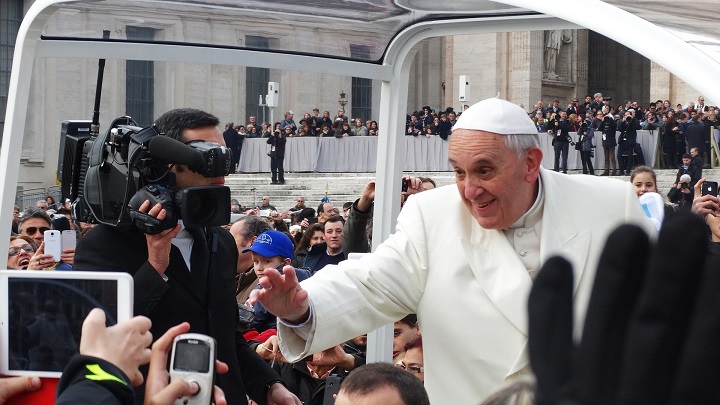
This morning, 10 January, Rebecca Rist, Professor of Medieval History at the University of Reading, featured in an episode of the BBC Radio 4’s In Our Time with Melvyn Bragg. The topic was ‘Papal Infallibility’ and she was joined in the studio by Miles Pattenden (University of Oxford) and Tom O’Loughlin (University of Nottingham). Rebecca spoke about the early Church, the medieval papacy (her research speciality) and the history of papal infallibility more widely – which she writes about here.
We do not find the concept of papal infallibility in ancient texts. Early Christians did not consider that even bishops might err until the Council of Antioch (264). Nevertheless, from the very beginning there has always been the idea of the Church’s indefectibility – that it and its teachings will always survive.
Right first time
The idea of Roman primacy derived from Biblical texts, in particular Matthew 16: 18-19 which describes the powers of binding and loosing Jesus gave to St Peter and which early Christians believed was also given to his successors.
Rome was always a special place. It had spiritual claims to authority because of Peter, who had been its first bishop and was martyred there, and political authority as the seat of the ancient western Roman Empire. Yet the early pre-eminence of Rome was not only due to Peter. St Paul too was martyred there and Clement of Rome (c.91-c.101) was among those who boasted of Rome’s authority because of the ‘presence’ in the city of both Peter and Paul. Hence the cemetery of Saint Sebastian in Rome was named ‘Memoria Apostolorum’ (‘Apostolic Memorial’).
Although the patriarchates Antioch and Alexandria also had apostolic claims, they were overrun by Islam in the seventh century, while Constantinople, although a seat of eastern political power, had no apostolic tradition, and Jerusalem only became a patriarchate comparatively late. The writings of men from the first to the sixth centuries A.D. such as Clement of Rome, Cyprian of Carthage (c.200-258), and popes Leo I (440-461), Hormisdas (514-523) and Agatho (678-681) all describe the bishop of Rome as having some sort of primacy over the other patriarchates. Early popes such as Gregory I (590-604) did a huge amount to bolster Rome’s power and ensure its effective administration.
During the High Middle Ages (eleventh-thirteenth centuries) popes had great power in the spiritual sphere as supreme religious leaders in the west, but also temporal power through the papal states. The idea of papal infallibility does not arise in texts from this time, but we see embryonic intimations. In his work the ‘Dictatus papae’ Gregory VII (1073-1085) claimed an extremely exalted position for the papacy, while Innocent III (1198-1216) claimed to exercise ultimate authority not just in the spiritual but also in the temporal sphere ‘ratione peccati’ – by reason of sin – which covered just about everything! Boniface VIII (1294-1303) in ‘Unam sanctam’ (1302) claimed that adherence to the Catholic faith was necessary for salvation.
Stuck with the past
The idea of papal infallibility arises in the thirteenth century in the context of increasing Franciscan influence at the papal curia. Pope Nicholas III (1277-1280) had approved the idea of apostolic poverty and arranged for the papacy to own all the Franciscans’ wealth to allow them to live in poverty. However the Franciscan Peter Olivi (c.1248-1298) was worried that a pseudo-pope would arise who would deprive the Franciscan of their rights. He therefore argued that statements of popes were infallible – i.e. irreformable – a pope could not go back on the utterances of his predecessors. So papal infallibility was the opposite of papal sovereignty since it bound the pope to the statements of his predecessors.
The issue of infallibility further arises with William of Ockham (c.1287-1347), an opponent of John XXII (1313-1334) who he wished to thwart since that pope had denied the Franciscans’ interpretation of poverty and condemned the pro-Franciscan decrees of Nicholas III. Hence, Ockham argued for papal infallibility in order to bind John XXII to the declarations of his predecessors.
The idea of papal infallibility also begins to arise in the medieval Church over the issue of papal canonisation of saints. As popular cults to certain saints grew during the High Middle Ages, the papacy began to take on the role of deciding which saints ought to be officially canonised. In the thirteenth century, as the Mendicant friars (Franciscans and Dominicans) began to push for the canonisation of saints belonging to their Orders, theologians such as Bonaventure (1221-1274, a Franciscan) and Thomas Aquinas (1225-1274, a Dominican), claimed that popes could not err in their decisions about canonisation.
The Western Schism (1378-1417) brought about the Conciliar Movement: the idea that the Church should not be ruled by a sovereign pope, but rather that the supreme authority of the Church resided, not in the pope, but in Church councils. The Conciliarists believed that the pope could err, but a Church council could not. William of Ockham had argued for papal infallibility as a means of limiting the pope’s power. But increasingly it was the anti-Conciliarists who took up the idea of papal infallibility, albeit in certain carefully circumscribed ways – namely only when the pope was speaking on matters of faith and morals. Hence the idea of papal infallibility became in the writings of men such as the Carmelite Guido Terreni (an early example – c.1270-1342) a way to increase the sovereign power of the pope.
At the Reformation Catholics looked to the pope as a symbol of the old faith in countries which had become Protestant. Yet there is nothing per se about papal infallibility at the Council of Trent (1545-1563). The seventeenth century saw the Scientific Revolution, often treated with scepticism by a defensive counter-reformation papacy: Galileo’s ideas were condemned, a prohibited list of books was created, and Innocent X (1644-1655) condemned the Jansenists for their ideas about free will. The eighteenth century saw the papacy battling Gallicanism – the idea that the monarch was on an authoritative par with the pope.
Unifier or Oracle?
Yet it was only in the nineteenth century that that idea of papal infallibility really came to a head. In 1854 Pius IX (1846-1878) decreed the doctrine of the Immaculate Conception to be infallible in his bull ‘Ineffabilis Deus’. Then the First Vatican Council (1869-1870) in its decree ‘Pastor Aeternus’ (1870) declared that the pope was infallible when he spoke ‘ex Cathedra’ (‘from the Chair’) on matters of faith and morals. The convert John Henry Newman (1801-1890) worried about the growing cult of the pope, and criticised those Catholics known as Ultramontanes who emphasised papal infallibility. He thereby earned the condemnation of the conservative Cardinal Manning (1809-1892).
At a time of resurgent Catholicism in France, as expressed by the building of new churches such as the Sacré-Coeur basilica at Montmartre, the pope continued to be almost a cult figure. This was at a time when popular devotion to the Virgin Mary reached its peak, finding perhaps its most famous expression at Lourdes. It was not surprising that the only other infallible ‘ex Cathedra’ statement which the papacy has ever made came in 1950 when in his bull ‘Munificentissimus Deus’ Pius XII (1939-1958) defined the doctrine of the Assumption of Mary.
Hence, whereas the role of a medieval pope was as a teacher and supreme judge, and ultimately as a figure of unity, in later centuries, particularly the nineteenth, he was seen as an oracle of God.
In his encyclical ‘Lumen Gentium’ (1964), during Vatican II (1962-1965), Paul VI (1963-1978) defined papal infallibility more clearly: when a pope speaks EITHER ‘ex Cathedra’ OR in an ecumenical council on a matter of faith and morals. So almost all pronouncements by popes are not infallible (e.g. on contraception), but nevertheless should be taken seriously since the pope is St Peter’s successor.
There is still a wide debate about infallibility in the Church today with Catholics not always agreeing as to what it means! In a further twist, Benedict XVI (2005-2013), clearly differentiated between the solemn (but not infallible) pronouncements he made as pope and the books he wrote on the life of Jesus of Nazareth in his own person. In a media age, it is a problem for recent popes that every word they utter may easily be taken as infallible when it is clearly not.
By Rebecca Rist, Professor of Medieval History, University of Reading
- In Our Time: Papal infallibility was first broadcast on BBC Radio 4 on 10 January 2018. Listen again via the BBC website.

